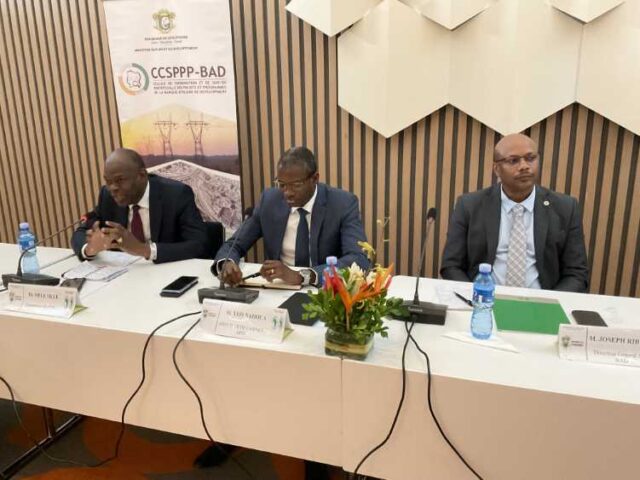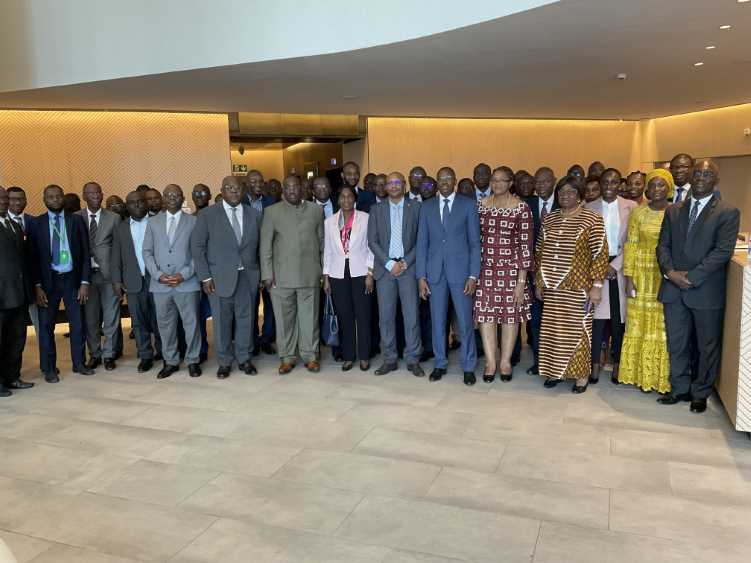The discussions focused on the first version of the country diagnostic note, prepared by the Bank for Côte d’Ivoire, and the completion report of the Bank’s 2018-2022 Country Strategy Paper (CSP)
The African Development Bank (www.AfDB.org) and the government of Côte d’Ivoire initiated a preliminary dialogue in Abidjan on July 18-22, 2022, to lay the foundations for the Bank’s strategy in Côte d’Ivoire over the next five years.
Led by the Bank’s Deputy Managing Director for West Africa, Joseph Ribeiro, the Bank’s delegation held weeklong discussions with various stakeholders and partners in Côte d’Ivoire, including senior government officials from the Prime Minister’s office, the Ministry of Planning and Development, Ministry of Economy and Finance, and technical departments of the main ministries concerned with the Bank’s work in Côte d’Ivoire. Technical and financial partners of Côte d’Ivoire also took part in the meetings, as did representatives of the Ivorian private sector and civil society.
The discussions focused on the first version of the country diagnostic note, prepared by the Bank for Côte d’Ivoire, and the completion report of the Bank’s 2018-2022 Country Strategy Paper (CSP) (https://bit.ly/3zg0B7e) for Côte d’Ivoire, which expires at the end of the year. The dialogue also included a performance review of the portfolio of projects financed by the Bank in Côte d’Ivoire during 2022. Lessons were learnt regarding cooperation between the Bank and Côte d’Ivoire, and a number of strategic and operational recommendations were formulated with a view to improving future projects.
“Côte d’Ivoire is a strategic partner of the Bank and this dialogue with government and other stakeholders has enabled a complete diagnosis of our actions in Côte d’Ivoire and identification of strategic directions for the future Country Strategy Paper, which will cover the period 2023-2027 and will be linked to priorities of the government’s National Development Plan for 2021-2025,” Ribeiro said.
“The Bank has successfully adjusted its interventions through the use of more appropriate tools and mechanisms, as shown by the Covid-19 Rapid Response Facility, which provided a cycle of general and sectoral support for the national budget, and the Emergency Food Production Programme, which provides FCFA 96 billion ($159.33 million) of budget support to deal with consequences of the crisis in Ukraine,” said the head of the office of the Minister of Planning and Development, Yéo Nahoua, who led the Ivorian delegation.

The Bank is ready to support Côte d’Ivoire in implementation of its National Development Plan and provide necessary resources in the priority sectors identified by the government
“I take this opportunity to thank the Bank authorities, on behalf of the Minister of Planning and Development, which acts as the Bank’s governor for Côte d’Ivoire, for their contribution to the resilience of our economy and for further improvement in the quality of our cooperation,” he added.
The Bank’s current Country Strategy Paper (CSP) for Côte d’Ivoire, which runs to the end of 2022, supports implementation of the Ivorian government’s National Development Plan for 2016-2020. The two pillars of the plan are: strengthening key infrastructure and governance for greater competitiveness and investment efficiency; and the development of agro-industrial value chains to promote inclusive and sustainable growth.
Achievements to date regarding the first pillar include progress in the transport and energy sectors. The Bank’s interventions have been instrumental in achieving a 3.4% increase in the extent of paved intercity roads and an 83% increase for urban highways, helping to lower domestic and international transport costs and to improve trade with neighbouring countries. In the energy sector, the Bank’s interventions helped to raise access to electricity by 8.6%, although failure to achieve the target of 20% shows that further efforts are required.
Participants of the Bank-government discussions noted that challenges remain for strengthening governance in sectors concerned with the first pillar, and that interventions are to be stepped up for improvement of the business climate and support to small and medium-sized enterprises.
Regarding the second pillar, the Bank’s operations have strengthened research management structures in the agricultural sector and improved productivity in several agricultural sectors (maize, rice, cassava and market gardening). But more work needs to be done to support the infrastructure of agricultural value chains, particularly agro-industrial processing of local products, which is a key element of the second pillar.
The Bank had a portfolio of 44 projects in progress at the end of June 2022 in Côte d’Ivoire, representing commitments of approximately FCFA 1,528 billion or $2.41 billion. The commitments are dominated by transport infrastructure (43.5%), followed by energy (23.6%), agriculture (19.4%), social (4.9%), governance (4.3%), finance (2.2%) and water and sanitation (2.1%). Total portfolio volume has quadrupled over five years, the disbursement level is 44% and the portfolio has an average age of 3.9 years. Portfolio performance is deemed satisfactory overall, with a rating of 3 on a scale of 1 to 4, but implementation challenges have included long execution times, partly related to the quality of project feasibility studies and extended response time. The discussions also focused on the share of non-performing projects, which now stands at 41% after falling below 30% at the end of 2021. The reasons for non-performing projects were noted. They include launch difficulties for new projects, implementation of timeframes beyond five years and low disbursement rates.
“The Bank is ready to support Côte d’Ivoire in implementation of its National Development Plan and to provide necessary resources in the priority sectors identified by the government. The discussions also focused on support for human capital and capacity building. We are ready to examine all this in discussions specifically focused on the Country Strategy Document for the period 2023-2027,” Ribeiro concluded.
Distributed by APO Group on behalf of African Development Bank Group (AfDB).




